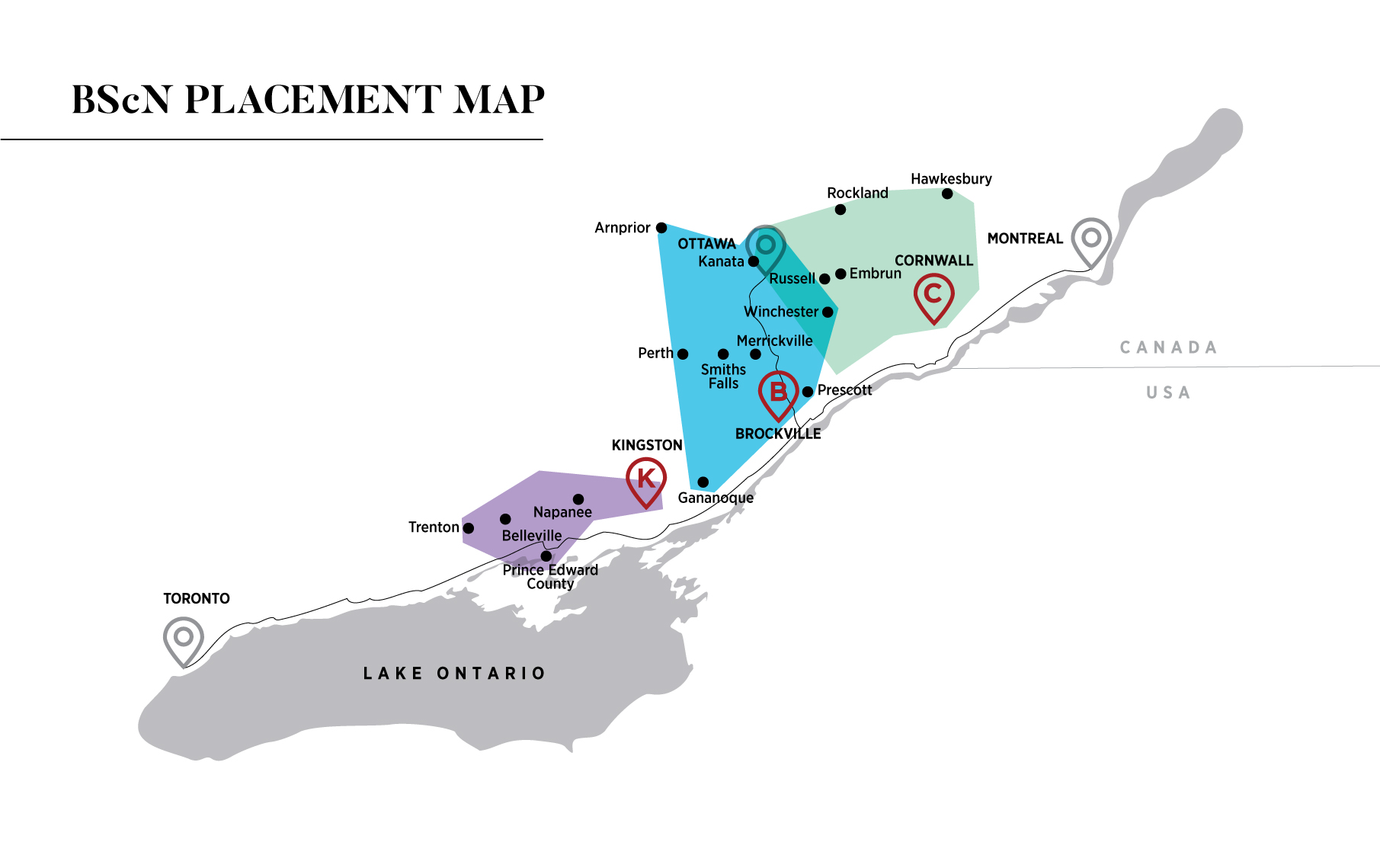We have been delivering quality nursing education in our communities for over 50 years. We were one of two colleges in the province to be granted approval to have our own nursing degree and the first Ontario college to receive accreditation from the Canadian Association Schools of Nursing (CASN). This is a testament to our history of accredited excellence in nursing education.
- Start clinical placements early in the program (first semester)
- Unique variety of interesting clinical opportunities
- Supportive course professors and instructors
- Smaller class sizes
- Small campus sizes
- Specialty nursing courses (Critical care concepts, OR) and labs
- Strong track record of employment after graduation
- Studying close to home is an option for people living in Eastern Ontario
- Strong ties with local health care agencies that support student and new graduate employment
- NCLEX pass rates above the Ontario average *near 90% on first writing
Your professors will come from nursing and other disciplines. All Nursing professors are members in good standing with the College of Nurses of Ontario and have a wide variety of clinical and professional experience. Most professors continue to actively work in their field outside the College, including acute care and community areas. In-class professors hold a minimum of a Master’s degree and many have PhDs. All faculty are engaged in research and scholarship, presenting this at provincial, national, and international levels. All clinical and lab instructors have Bachelor’s degrees.
Our diverse student population includes students directly from high school, people pursuing nursing as a second career, or after previous post-secondary education.
Our state-of-the-art labs are integrated into all four years of the program. In the nursing labs, students will practice skills and engage in simulation scenarios that facilitate the progression of skills from basic care to complex patient and family situations. All labs include high-fidelity mannequins and specialty labs for critical care, the OR, and Home Suites. All three campuses have level 2 microbiology labs, and well equipped anatomy and physiology labs. Take a virtual tour of our campuses using the links below:

Students will have placements in a variety of settings, starting with long-term care placements in year 1 and going to hospitals and community-based settings in the other years of the program. Depending on the campus you are studying at, placements are located across the Eastern Ontario Region, primarily along the St. Lawrence Corridor.
- In year 1 students are placed in long term care, under the supervision of a clinical instructor. The focus in year 1 is learning basic care principles including developing professional relationships with residents, assisting with personal care and completing physical assessments.
- In year 2 students are placed in hospitals, under the supervision of a clinical instructor. The focus in year 2 is building on the principles learned in year 1, learning about and giving medications, and learning about and practicing additional nursing skills.
- In year 3 students continue to spend time in hospitals under the supervision of a clinical instructor. Additionally, in year 3 students begin placements in community settings, supervised (preceptored) by a nurse working in the community. These placements can include public health, home care, family health clinics, schools, etc.
- In year 4 students complete two consolidation placements where they work one-on-one with a Registered Nurse, in hospitals and community-based settings.
A unique variety of clinical placements are available for students who meet certain requirements, in areas such as:
- Critical care (Emergency and Intensive Care)
- Correction Services Canada
- Public Health Units
- Peri-operative (Pre-op/OR/recovery)
- Maternity
- Mental health
- Paediatrics
The program is open to full-time students only.
Our graduates are prepared and recruited to work locally, provincially, nationally and internationally.
SLC has faculty led, cross cultural elective courses in international (Tanzania) and Northern Ontario settings. Second- and third-year students can apply for the cross-cultural courses. These courses require student self-funding in some cases but are college funded in other situations.
Fourth year students can also apply for rural and remote clinical experiences.
Yes we do! The RPN-BScN Bridge program obtained ministry approval in 2024. Any inquires should be directed to Laralea Stalkie, Associate Dean at LStalkie@sl.on.ca.
The SLC BScN program has been approved by the College of Nurses of Ontario. We also received a 7-year approval from the Post-Secondary Education Quality Assessment Board. We are also the first Ontario Stand-Alone nursing degree to obtain accreditation from the Canadian Association of Schools of Nursing (CASN). Our RPN-Bridge program will be eligible for accreditation after our first graduating class in 2026. With our proven track record, we are certain this will obtained, given our Stand-Alone has been accredited.